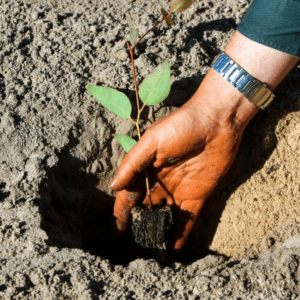It’s no secret that climate changes is one of the biggest challenges the world is facing. Constant discussions in the media around the Paris Agreement, Net Zero emissions strategies and our politicians failing us can sometimes make it feel as though we’re fighting a losing battle, and there’s nothing we can do to make a difference. And while global leaders and businesses definitely need to smarten up and be part of the positive change, there are lots of small changes you can make in your life that will decrease your negative impact on the environment and help create change for good.
Here are 10 easy life-changes you can make right now to lessen your impact on the environment.
1. Cut down on the chemicals
No one likes a dirty house! But, you may be surprised to learn that some of the most common cleaning products at your local supermarket are contributing to both water and air pollution because they contain toxic chemicals (and they aren’t so great for your health, either!). There are many environmentally friendly products out there that you can make the switch to today (we recommend checking out Zero Co), but if you want to go even further, you could try making your own products using commonly found pantry ingredients like bicarb soda, vinegar or lemon juice. There are plenty of recipes for various DIY products online, so get searching and start creating.
2. Reduce your hot water temperature
According to the ABC, it's estimated 21 per cent of the energy used in the average Australian home is due to heating water. You may have your hot water system running at a higher temperature than necessary, which will mean it’s using more energy than required. So, why not try turning it down a few degrees to decrease your overall energy consumption. While every hot water system is a little different, many have a simple thermostat you can adjust, so give it a go and watch your energy bill plummet.
3. Treat yourself to a meal out
Tempted to grab takeaway lunch and eat at your desk? Aside from the toll working through your lunch hour takes on your mental and physical health, takeaway food tends to come with all sorts of single-use packaging, which is no good for the environment. By treating yourself to a cheap and tasty meal at a cafe or food court, you’ll be able to avoid the plastic containers and cutlery and use the crockery provided, keeping both your tummy and the planet happy.
4. Switch up your search engine
Nowadays, whenever you want to know anything — from the weather to a recipe, the natural response is to ‘Google it’. But what if there was a way to get the information you need AND help the environment at the same time? Enter Ecosia. Ecosia is a search tool that plants trees using the profits they make from people browsing the internet. It doesn’t cost users anything except a couple of minutes to make the switch. Then by simply going about your normal business, you’ll be helping contribute to reforestation projects that help sequester CO2, provide animal habitats and support communities with fair employment. Winning!
5. Get crafty
There are many incidental items in everyday life that we buy, use and throw out without thinking. Take single-use face wipes, paper towel or even tea bags! But, if you’re happy to get a little bit creative, all you will need are some scraps of fabric and possibly a sewing machine and you’ll be able to create all sorts of reusable items yourself, saving both the environment and your wallet down the track.
6. Challenge yourself in the kitchen
If you’re the sort of person that fancies themselves a budding masterchef, there are a whole lot of different ways you can help the environment by cooking more and buying less. Instead of buying pre-packaged items like mueslis or soups, why not buy the wholefoods and whip them up yourself? They will most likely be better for your health, better for the environment and yummier than their mass-produced counterparts. If you’re into baking, buying a bread maker and baking your own bread is another sustainable option (and much tastier too!).
7. Swap to a more plant-based diet
Speaking of food, cutting down on your red meat consumption is another easy way to help the environment. While you might not be ready to make the switch to a fully vegetarian or vegan diet, any meat-free meals that you can commit to will help reduce the environmental impacts that animal products cause. Plus, switching out beef or lamb for chickpeas or lentils every now and then is a great dietary change up (and much cheaper too).
8. Walk, cycle or take public transport
According to the Climate Council, cars are responsible for roughly half of Australia’s transport emissions, each year, emitting about the same amount as Queensland’s entire electricity supply! So, if you’re in the position to walk, cycle or take public transport, it’s a much more environmentally friendly option. If there’s no way to avoid driving, try carpooling with other people where possible, to cut down on the amount of cars on the road.
9. Keep a rubbish diary
Food waste typically ends up in landfill, which then expels methane into the atmosphere, which is 25 times more damaging than carbon dioxide. So, that means that cutting down on food waste is really important if you want to lessen your impact on the environment. But you can’t fix a problem if you don’t know what the problem is! So, keep a rubbish diary and log a record of every piece of food you throw out each week — from each limp vegetable to leftovers from dinner. Over time, you’ll be able to tweak your shopping and cooking habits to ensure you’re only buying and cooking what you need.
10. Repair rather than replace
Vacuum cleaner failing you? Not only will it be cheaper to try repairing it than replacing it immediately, it’s also better for the environment. If you’re able to use what you already have (or borrow from a friend!) you will reduce the amount of resources required to make and ship new products. Outdoor clothing company, Patagonia, have raised awareness about the negative impacts of consumerism on the environment but running a ‘Don’t buy this jacket’ campaign, asking people to reconsider the need to buy something new and offering tips for DIY care and repair, as well as a repairs service.
Liked this article? Here's another you might like:





